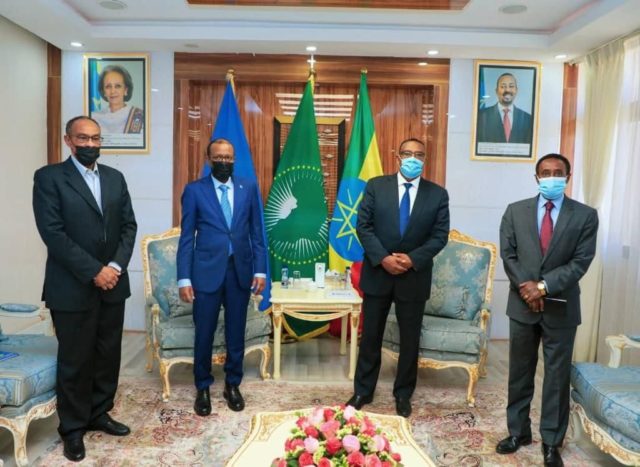The fight for access to — and influence in — the Horn of Africa is heating up between regional and global powers. The Horn serves as a gateway to Africa’s vast natural resources for both Asia and the Gulf. While the growing interest of great powers in the Horn may lead to more development in the region, rival states’ battles threaten to further destabilize the region.
Furthermore, the ongoing conflict in Ukraine has exacerbated already-existing inflationary trends in global commodity markets. Gulf states, which have already invested heavily in large swaths of farmland in various African countries, are more eager than ever to secure alternative food sources. China, which opened its first foreign military base in Djibouti in 2017, is also concerned (al-Jazeera, August 1, 2017). The importance of Africa’s vast underdeveloped natural resources has long been recognized by China. China’s influence now stretches across the entire continent, thanks to two decades of investment and clever debt management. The Horn of Africa, on the other hand, is of particular importance to the Chinese and, increasingly, regional powers.
Using Weapons to Gain Influence
Ethiopia and Somalia are the two countries on the Horn where regional powers are increasingly competing for influence and access. The Ethiopian war, which pits the government against multiple separatist groups, has provided China, Turkey, Iran, and the United Arab Emirates (UAE) with an opportunity to strengthen their influence by supplying weapons and expertise. The Ethiopian Prime Minister Abiy Ahmed’s government was likely saved from defeat by the Tigray People’s Liberation Front (TPLF) thanks to the Unmanned Aerial Vehicles (UAVs) provided by Turkey, Iran, and the United Arab Emirates (al-Monitor, January 21; al-Jazeera, December 10, 2021; The Africa Report, January 25, Garowe Online, August 18, 2021). Armed unmanned aerial vehicles (UAVs) made Turkey, Iran, and China were critical in halting the TPLF’s march southward toward Addis Ababa, Ethiopia’s capital (Terrorism Monitor, November 5, 2021).
Buying influence with weapons is nothing new. The types of weapons and the provision of armed UAVs to Ethiopia by regional powers such as the UAE and Turkey, however, is a departure from previous policies. China has long preferred to weave nations into its ever-expanding web of client states through debt and investment. Gulf countries, on the other hand, have a long history of securing influence through investment and aid. Turkey is an outlier, particularly in the Horn of Africa, where it has pursued a tough foreign policy in Somalia. Turkey has made significant investments in Somalia, where it operates Camp TURKSOM, its largest foreign military base (Daily Sabah, April 5).
China provided military assistance to Somalia’s government in March. The assistance, which included armored personnel carriers (APCs) and surveillance drones, was ostensibly intended to help the government fight al-Shabaab (All Africa, March 19). [1] China’s overt delivery of military aid to Somalia is yet another sign that competition for influence and access in the Horn, particularly in Somalia, is heating up. Somalia’s importance will only grow as a result of its long coastline, ports, and potentially abundant on- and off-shore oil and gas. However, the presence of multiple regional and global powers in Somalia and the Horn of Africa suggests that instability will worsen as rival powers support favored political parties and rebel groups.
Somaliland defies the odds.
Somaliland, an autonomous but unrecognized country in the Horn of Africa, is a unique outpost of stability. Somaliland, unlike Somalia, has avoided foreign intervention in its internal affairs. Instead, Somaliland’s government has encouraged investment from a number of countries, including the United Arab Emirates, while maintaining its neutrality. In 2019, the government of Somaliland’s president, Muse Bihi Abdi, revised an agreement with the UAE that would have seen the UAE build a military base near the port city of Berbera as an example of its commitment to neutrality (Garowe Online, March 4, 2020). Rather than a military base, however, the UAE and Somaliland agreed to build a commercial center.
Somaliland is also one of the few African countries to have defied Chinese hegemony. Rather than accepting lucrative aid and investment offers from China, Somaliland is focusing on strengthening ties with the United States, the United Kingdom, and the European Union (al-Araby, March 28). Furthermore, by exchanging ambassadors with Taiwan, Somaliland ran the risk of enraging China (Somaliland Chronicle, July 5, 2020).
Somaliland’s neutrality should be a model for the region at a time when regional and global rivals are determined to secure access to diminishing resources. However, Somaliland, like the rest of the Horn of Africa, faces a slew of problems ranging from drought to youth unemployment. Without careful consideration, the Horn’s last bulwark of stability could crumble as rival powers exploit divisions to further their own agendas.
Outlook
Interest in the Horn of Africa will continue to grow as nation states compete for natural resources. With the notable exception of Somaliland, the Horn of Africa has been beset by decades of instability, which is now on the rise once more. This comes at a time when the United States’ interest in the Horn of Africa appears to be waning, while newly assertive regional powers such as Turkey and the United Arab Emirates are ramping up their involvement.
Ethiopia and Somalia both have severe and deepening internal strife. Rival states can and will most likely take advantage of these divisions to gain a foothold. Ironically, the competition for access and influence in the Horn may ensure that instability rises to the point where the region’s natural resources are unable to be developed. Increasing instability, on the other hand, will continue to provide terrorist groups like Somalia’s al-Shabaab with opportunities to expand their operations.

